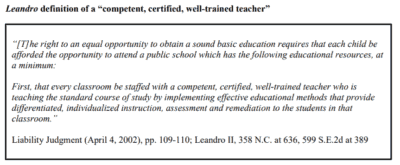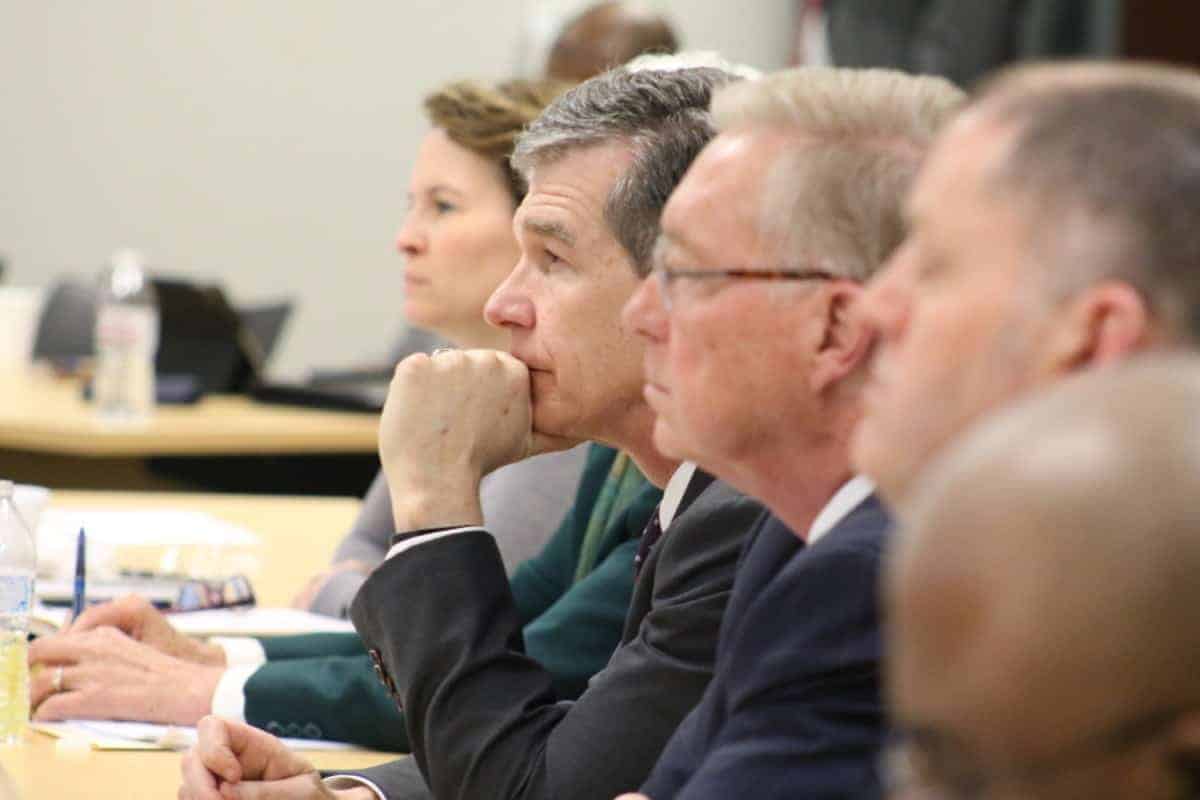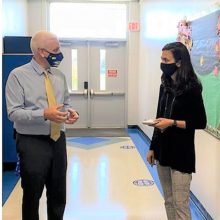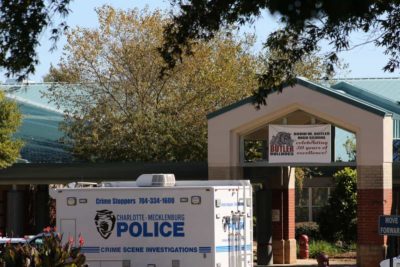Leslie Winner opened Tuesday’s meeting of the Governor’s Commission on Access to Sound Basic Education by reviewing the Leandro definition of a competent, certified, well-trained teacher. In her remarks, Winner emphasized the high bar set by the latter portion of the definition that requires teachers to provide “differentiated, individualized instruction, assessment and remediation” to students.


The definition was printed on the agenda for the meeting, which focused on teacher preparation, recruitment, placement, and induction to ensure North Carolina meets its Leandro commitment to provide every student in North Carolina with equal opportunity for educational success.
Created by Governor Cooper in 2017, the commission met for the first time in Nov. 2017 and has future meetings planned through April 2019, after which it is expected to release a final report. Previous meetings of the commission have addressed topics like school funding, early childhood education, and the principal pipeline. According to Winner, future meetings will address supporting and retaining teachers and providing career pathways. The commission will meet next on January 17.
Before presentations began, Winner provided a report from the commission’s teacher work group that summarizes teacher recruitment programs in North Carolina and noted that the North Carolina Teaching Fellows Program is the only large-scale, statewide teacher recruitment effort. Recently redesigned, the NC Teaching Fellows Program provides scholarships to students to attend one of five colleges across the state before they become special education or STEM teachers.
The state of teachers in North Carolina
Dr. Tom Tomberlin, the director of district human resources for the NC Department of Public Instruction (DPI), provided the first presentation to the commission on the most recent data from the State of the Teaching Profession report published by DPI every year.
Tomberlin’s presentation focused on teacher attrition rates, or the percent of teachers who are no longer employed at NC public schools from one year to the next, as well as the relative effectiveness of those who leave the profession versus those who remain. As a metric for teacher effectiveness, Tomberlin referenced average EVAAS scores.
“It is true that those who are leaving the profession are less effective than those remaining in the profession, but I don’t think we should take great comfort in this. Within those average EVAAS scores, there’s wide variation,” said Tomberlin. “It is true that we are losing every year teachers who are highly effective with their students, and even average teachers is a great loss to the state of North Carolina.”
Tomberlin then displayed a chart of the districts with the five highest and five lowest rates of attrition. Many of the LEAs with the highest rates of attrition are located along the I-95 corridor and are, as Tomberlin put it, the “Leandro districts.” Unlike other small, rural districts in the western part of the state, districts like Warren County and Halifax County have attrition rates more than double the statewide average of 13 percent.
“The problem is, if you look at 2015-16, this story is exactly the same. This is an insidious cycle that these districts are in,” said Tomberlin. “They’re constantly losing their experienced teachers, unable to replace them with experienced teachers from other districts, and having to replace them with brand new, ineffective teachers.”
Commission member Helen Ladd asked Tomberlin for his personal view on the merits of EVAAS as a measure of teacher effectiveness. Tomberlin said he believes the scores are important but insufficient.
“What I am concerned about as the director of that is it tells us something. It allows us to make some comparisons. It gives us what we often lack in education, which is real distinction, but I’m very concerned that we have just kind of stopped there and put all of our chips in that basket,” said Tomberlin. “I think there’s much more work to be done on understanding what an effective teacher is that we’re just not doing.”
Tomberlin’s full presentation can be found below.
Dr. Kevin Bastian, associate director and research associate at the Education Policy Initiative at Carolina, followed Tomberlin’s presentation with another look at the state of teaching in North Carolina. Reviewing data on the teacher pipeline, Bastian noted that the 15 UNC system colleges with education programs are the single largest supplier of teachers in North Carolina, supplying just over 36 percent of all teachers in the state, followed by out-of-state teachers at just over 27 percent.
Bastian then compared the differences in outcomes between teachers who are UNC system graduates and those who are not. Bastian’s research finds, on average, that UNC system prepared teachers are more effective in most areas than out-of-state and alternative entry teachers, which make up the bulk of North Carolina’s teachers. However, UNC system prepared teachers are less effective in most areas than teachers from Teach for America or Visiting International Faculty, which make up a small portion of the state’s teachers.
These comparisons can be found on pages four and five below.
Insight from deans
The commission then heard from a panel of four deans from various schools of education across the state, moderated by Dr. Charles Coble. Dr. Ann Bullock, Dean of the School of Education at Elon University; Dr. Teresa Petty, Associate Dean of the Cato College of Education at UNC-Charlotte; Dr. Melba Spooner, Dean of the Reich College of Education at Appalachian State University; and Dr. Miriam Wagner, Dean of the College of Education at North Carolina Agricultural and Technical State University, shared their thoughts on teacher recruitment and preparation in North Carolina.
Themes that emerged from the panel discussion included the importance of establishing strong partnerships between colleges of education and K-12 school systems, preparing teacher candidates through student teaching, and providing professional development and support to new teachers.
Dr. Fouad Abd-El-Khalick, Dean of the UNC School of Education, urged his fellow commissioners to think beyond the dichotomy of traditional versus alternative and the assumption that alternative teacher preparation programs are more flexible and innovative.
“What you’ve seen described here is teacher ed 3.0 — we’re talking about immersive programs, we’re talking about locally based, we’re talking about deep partnerships, we’re talking about curricula that are highly connected,” said Abd-El-Khalick. “Those 3.0 programs which are the most effective are the ones that are most resource-intensive at the same time.”
Brad Wilson, chair of the commission, acknowledged the role that financial resources play in the state’s ability to satisfy the Leandro constitutional mandate.
“I believe our recommendation is going to need to be more than just a menu that people can pick from, and particularly from a funding standpoint,” said Wilson. “Wherever we end up, we’re going to have to address the allocation and the volume of resources that will be deployed.”
Bullock said the state needs to return its focus to the competencies and outcomes that contribute to an effective teacher and create an assessment-driven model at the state level that shows which teacher preparation programs are high-quality.
“While we have five professional teaching standards and we’re all staying accredited, sometimes there’s a little too much choice and not around a competency model that I see. We think far and wide about types of programs and not quality of programs,” said Bullock.
Bullock then urged the commission to think about the “long play” when it comes to teacher education.
“The long play does need to include pay,” said Bullock. “I feel like when we got off track, all these other programs were created, all these others ways to become a teacher … and we need to go back to what are our outcomes and what are our competencies.”
Supporting beginning teachers
Dr. Linda Darling-Hammond, president and CEO of the Learning Policy Institute, and Charles E. Ducommun, Professor of Education Emeritus at Stanford University, presented via video call on the core aspects of a successful induction model for beginning teachers. According to Darling-Hammond, things like coaching from a mentor, a reduced teaching load, and collaborative professional development can boost beginning teacher retention and effectiveness.
She also said it’s important for beginning teachers to remain in the same content and grade level for a few consecutive years.
“What ideally one would do is start to reduce the amount of load that’s placed on beginning teachers so that they do have more scaffold and supported assignments rather than getting what everyone else doesn’t want and getting moved around every year,” said Darling-Hammond.
Another aspect of successful teacher induction is providing them with curriculum and planning support from a mentor who has experience in the same content area and grade level as the beginning teacher. Darling-Hammond’s full presentation is below.
Dr. Patrick Conetta, director of teacher induction and development for the North Carolina New Teacher Support Program (NC NTSP), presented on their induction model. According to Conetta, the program is a university-based induction model that provides induction support for beginning teachers. The goal of the program is to increase teacher retention and boost student achievement by increasing teacher effectiveness.
Three core services are provided to the beginning teachers who participate: a conference-style fall institute, ongoing professional development, and intensive instructional coaching. Nine institutions of higher education work with LEAs to administer the program. NC NTSP receives $2.2 million in General Assembly funding per year and the cost for districts is $2,200 per teacher.
Commissioner Rick Glazier asked why the program doesn’t partner with any historically black colleges or universities. Conetta said the NC NTSP recently transferred its fiscal authority, which was previously at the UNC system office, to East Carolina University and plans to bring an HBCU partner into the program in the spring.
After Conetta’s presentation, commission member Henrietta Zalkind asked how the commission would address the issue of equity across all areas of its work. Glazier noted that the NC NTSP doesn’t operate in some smaller, rural counties that may benefit the most.
“If you make the assumption that programs like the NC NTSP are crucial to reducing attrition and increasing competence and effectiveness … it’s the piece of evidence that you can point to on a map to show that Leandro is not being met.”
Ladd urged the commission to think beyond programmatic solutions.
“I’m hoping at some point we’ll have that big think. What is it we need to do to send signals to everybody that this state values education in a way consistent with Leandro?” said Ladd. “Let’s say we could even start from scratch, what would that mean?”
Conetta’s full presentation is below.
A model in South Carolina
The Center for Educator Recruitment, Retention, and Advancement (CERRA) operates in South Carolina and is the oldest teacher recruitment program in the country. To learn more about CERRA’s model, the commission heard from its executive director Jane Turner.
Funded by South Carolina’s General Assembly, CERRA’s goals are to ensure every school district has the teachers they need, every district has a high-quality induction program, teachers are retained in the classroom for at least five years, and teachers have leadership opportunities without leaving the classroom.
Describing CERRA’s vision, Turner said: “The teaching profession needs to be viewed more widely as a respected and influential profession, and that’s of course what our programs are aiming for.”
CERRA’s flagship program is a teacher cadet class for high school juniors and seniors that provides them with interpersonal and leadership skills with the hope that they will consider teaching as a career. Other programs include a teaching fellows program and a teacher leadership program. Turner’s full presentation can be found below.



